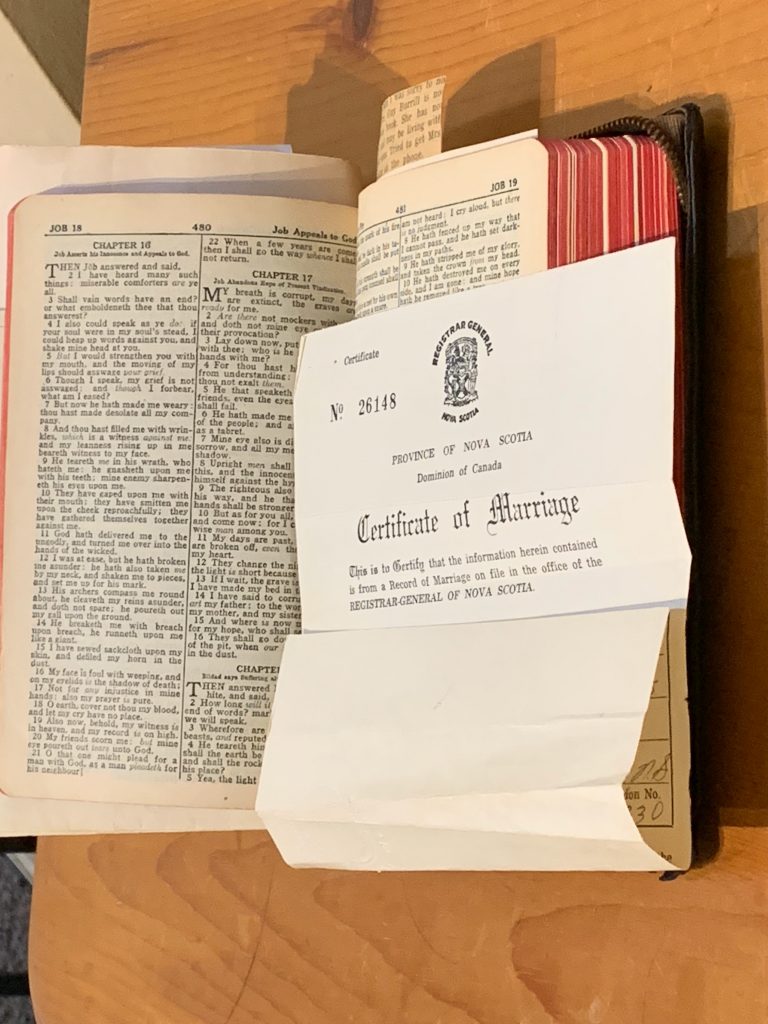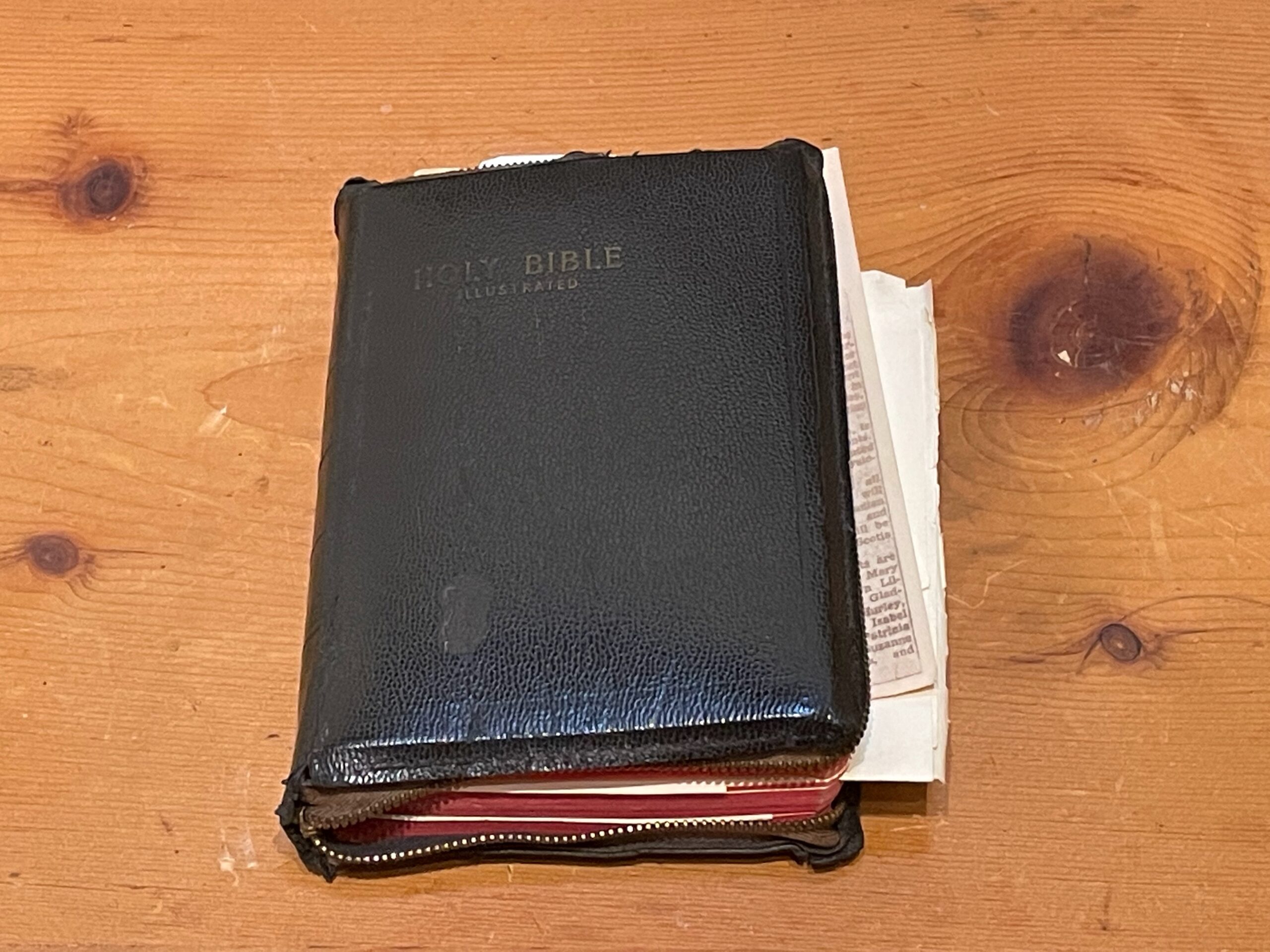When I was a child, I would tag along with my mother to my grandparents’ house almost daily. My grandparents’ house held little to interest children. The one book they did have was the Holy Bible, which lay at the centre of their table along with the mail and the local weekly newspaper. It wasn’t the contents of the scriptures that fascinated me, it was all the little articles cut carefully from the newspaper; the obituaries, the lighthearted poems, the gentle words of advice and instructions on how to be a good wife that kept me captivated during those long visits.
I open my parents’ Bible now. Inside the front cover, I learn that my father gave it to my mother for Christmas in 1947. My father was a good man, but I never felt that he was particularly religious. He rarely attended church, claiming that his heart disease made it difficult for him to sit through a service. My mother attended because they let her sing in the choir. I think it was common practice in those years to give the Bible as a gift. I received two before I turned 20.
You may unsubscribe from any of our newsletters at any time.
Between the Old and New Testaments, there is a section for recording major life events. Here, my mother recorded her marriage to my father, but after that, the documentation ended. This Bible is black and has a zipper around the outside edges, something that I always admired since neither of my Bibles had one and it seemed like a clever idea. You could store things inside without the fear of them falling out. The zipper on my parents’ Bible, though, could never be used within my memory because of all the extra bits and pieces of paper crammed inside. Some of these documents were important; both of my mother’s marriage licences and her birth certificate were kept in the book of Job. This makes me think about the trials of Job and wonder about those marriage licences.
Inside the Bible is an anecdote I wrote when I was 12 that my aunt had published in her local paper because it was about her. She titled it “A Wonderful Person,” although it wasn’t very flattering. I cringed at the title then, and I cringe now.
To my delight, there is a lock of my older daughter’s hair from her first haircut at the age of one year, three months and 14 days. I have a lock somewhere, but it is not documented so precisely.

At Isaiah 14, I find my grandfather’s secret recipe for a saddle sore cream for horses that he sold at the Annapolis County Exhibition every summer. It contained Vaseline, mutton tallow, beeswax, oil tar and turpentine, somehow melted together into a nasty black salve. My mother swore by its healing powers, and I spent most of my childhood with this ointment slathered over my knees.
In Jeremiah, I find newspaper cuttings of my graduation from Dalhousie University and a clipping from The Yarmouth Light on Feb. 9, 1950. This clipping was carefully cut to allow articles on both the front and the back to be saved. On one side is the history of the Kemptville church where my father learned his fear of the Baptist God. The other side reports the narrow escape of a family of five from their Bridgewater home when it caught fire.
More on Broadview:
- Why I love the image of Jesus as a gardener
- ‘The Believer’ explores the human need to put our faith in things unseen
- Spirituality apps and resources to turn screen time into sacred time
I keep thumbing the tissue-paper pages, but I can no longer find the recipe for a birth control cream. It was there years ago when I was browsing through the clippings with my mother. I wouldn’t have known what the recipe was to be used for if she hadn’t told me. Then I finally realized why the women in our town always snickered when they rubbed us with cocoa butter before we took our swimming tests in the icy waters of Findlay Creek. It was supposed to keep us from getting hypothermia when we were taking our swim tests from the Red Cross examiner that travelled to rural towns and villages in Nova Scotia at the end of every summer to evaluate children for their Red Cross badges. The base ingredient of that birth control recipe was cocoa butter.
I recently found the Bible I owned when I was growing up in Nova Scotia. When I picked it up, dried flowers long turned to dust spilled from its pages onto the floor. I remember that I stored corsages from Christmas dances and proms inside. They were precious then, but I can no longer remember many of those events, and the shy boys that handed me those flowers have long faded from my memory. By the time I finished high school, I had stopped saving flowers. I later saved swizzle sticks from frothy drinks, but it didn’t seem respectful to place them within the pages of the Bible.
Memories no longer seem to be stored in Bibles. We can now store things on our iPads and computers or in the cloud. But I never pick up a Bible without thumbing through the pages looking for a morsel of someone’s life.
***
Holly Kritsch is a writer of essays and memoirs who lives in Ottawa.














Reminds me of a true story from 35 or 40 years ago. A college-age fellow went away to school and his mother packed a Bible, telling him to read it regularly. He said he would. (But he didn’t.) A few weeks into school, he called home and said he seriously needed money. The mother asked him if he had been reading the Bible. (He said yes.) She replied, go read it more regularly. He looked and it was laced with numerous $20 bills!